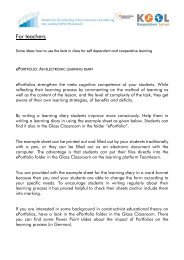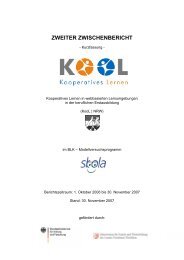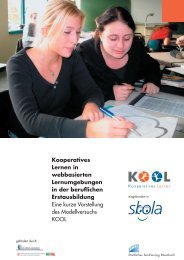ERSTER ZWISCHENBERICHT - e-Learning-Portal
ERSTER ZWISCHENBERICHT - e-Learning-Portal
ERSTER ZWISCHENBERICHT - e-Learning-Portal
Erfolgreiche ePaper selbst erstellen
Machen Sie aus Ihren PDF Publikationen ein blätterbares Flipbook mit unserer einzigartigen Google optimierten e-Paper Software.
For teachers<br />
Staatliches Berufskolleg Glas ● Keramik ● Gestaltung<br />
des Landes NRW ● Rheinbach<br />
Collaborative Publishing: Blog & Wiki<br />
The Internet offers publishing tools, which enable people without programming knowledge the possibility to publish<br />
easily. Two tools are blogs and wikis. Blog – a short form for weblog – belongs to one publisher and offers guests the<br />
possibility to post comments. A wiki offers the possibility to everyone to contribute texts and images easily.<br />
The learning blog of our college refers expressedly to the Internet language learning programme “English for<br />
Glass Professionals.” Posts are made be the editing teacher, referring to concrete tasks in the programme.<br />
Students usually have to comment on certain texts, podcasts, online courses, or research results. This is very easy,<br />
because no access is needed. You can reach it via the URL: http://www.glasfachschule.wordpress.com<br />
Blogging is a new cultural technique in the age of global electronic learning. As current scientific researchers<br />
(Forschungsstelle Neue Kommunikationsmedien) have found out, blogging is very effective, because according<br />
to constructivist educational theories it enables learners to construct knowledge while interacting with each other<br />
through communication. For those who are interested: “Wie ich blogge” (2005).<br />
URL: http://141.13.22.238/fonkblog/pdf/fonkbericht0601.pdf (retrieved: June 5, 2006)<br />
A possible didactical setting for blogs: After having produced podcasts on a special topic, for instance like the<br />
tasks in lesson two in this language learning programme, each student has to comment on at least two podcast<br />
of fellow students. As a teacher you should post a text in the learning blog where you invite students to leave their<br />
comments. You can do similar settings with texts, videos, online courses or whatever you find suitable. Important<br />
is only that students get into collaborative writing.<br />
Very effective about blogs: RSS Feeds. These are a sort of e-mails or newsletters you don’t get via your usual<br />
account, but which can subscribe to. This works for instance via Mozilla browser or feed readers. After<br />
subscription you get a shortcut on your screen, click on it and can see what’s new on the blog. This offers capital<br />
possibilites for letting your students choose material they might find useful, for instance hints for methodical<br />
learning, or hints on new publications, or useful websites, or whatever. Try it out and subsribe to the RSS Feed of<br />
the glasfachschule blog!<br />
Similarly you can use wikis. In this language learning programme we use the online wiki provided by<br />
www.schulwiki.org There students can easily add their own texts and images. This is for instance ideal for<br />
creating a glossary or dictionary. We want to encourage students to use the wiki especially for creating a glass<br />
glossary, which is done by them also in German. With this tool they can fortify their translating abilities and add<br />
links to glass resources on the web.<br />
comment by<br />
student 3<br />
podcast by student 1<br />
comment by<br />
student 5<br />
comment by<br />
student 4<br />
comment by<br />
student 6<br />
Seite 113<br />
comment by<br />
student 5<br />
podcast by student 2<br />
comment by<br />
student 3<br />
comment by<br />
student 6<br />
comment by<br />
student 4






